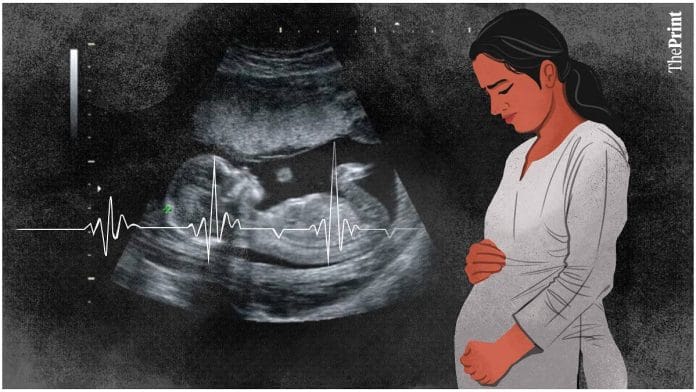At the age of 18, Indians can vote, give consent for sexual intercourse, and even choose their life partners. Yet, when two adult parents decide whether or not they want to give their unborn daughter a chance at life, culpability, as per the law, rests on the doctor who informs them that they are expecting a baby girl. Penal action is taken against the doctor.
Such has been the law for 30 years.
The Pre-Conception & Pre-Natal Diagnostic Techniques Act, 1994 does have room for culpability of the in-laws–clearly laying down that the woman who undergoes sex-selective abortion is not to be held guilty – but the provision is used rarely, if at all. The crime of sex-selective abortion emanates from the family, yet the brunt of that monstrosity has been borne by doctors and ultrasound machines–which produce images that can be used to detect the sex of an unborn child.
Strict norms govern the use of ultrasound machines; they have to be registered, and there are rules that state who may or may not use them. All this for a legitimate and multifariously used diagnostic device in a country that is grossly underserved in healthcare. The actual act of foeticide almost always happens outside of the formal medical system, thanks to India’s teeming army of quacks. There are many instances of action against doctors and clinics for violation of the PCPNDT Act, but hardly any penal action is taken against families.
This refusal to tackle the elephant in the room–families’ ruthless and criminal reluctance to have girls–and the convenient shifting of accountability to the medical profession may have been the only recourse available 30 years ago. But that may not be the case any longer, with India positioning itself as one of the global leaders in the field of digital health and having models that can combat the evil of sex-selective abortions better. It is also in the natural order of things that policies and laws evolve with changing realities. Tackling female foeticide seems to be a perfectly legitimate use of the digital health IDs that were created during Covid-19 vaccinations–some would say controversially–in preparation for building a robust digital health infrastructure in the country.
That is why Indian Medical Association (IMA) president Dr RV Asokan’s statement calling for the legalisation of prenatal gender determination is more than just IMA’s obligation to ensure doctors’ ease of doing business. It needs to be viewed as a call for taking the battle against sex-selective abortions to its logical next level using the tools that are available to us today, and fixing accountability where it belongs–with the family.
Also read: Abortion black market, touts, scan vans — how Haryana’s ‘Beti Bachao’ is losing momentum
Tackling the practice
It is true that India’s sex ratio has improved in these 30 years. But this is as much a function of improvement in female literacy or government campaigns like ‘Beti Bachao Beto Padhao’ as it is of the PCPNDT Act, which treats Indian parents as delinquent juveniles who are prevented from committing a crime only by withholding information about the sex of their unborn child. Female foeticides continue despite the law. In 2018, an estimate suggested that India has 6.3 crore fewer women than it should.
Dr Asokan’s solution of tracking every pregnancy was not an option 30 years ago, but now it is already being done to a substantial extent. While in 1994, when the PCPNDT Act was enacted, India lacked the tools and an adequate workforce; today, it has the Mother and Child Tracking System (MCTS), which tracks every pregnancy and the child born thereof up to the age of five.
MCTS was designed to track pregnancies and ensure mothers and newborns receive the necessary care and vaccines. Field health workers feed information into the system, which is monitored from a central control room that then sends the workers reminders about upcoming vaccinations and pre or postnatal check-ups. It is one of the reasons behind the improvement in infant and maternal mortality numbers in the country. A substantial proportion of India’s annual birth cohort of over two crore, which are monitored and cared for by ASHA workers, are already registered.
To make the tracking universal, all that is needed is a mandatory registration by the private sector, taking a leaf out of the tuberculosis book. Ever since TB was made a notifiable disease in 2012, TB patients diagnosed in the private sector have to be registered on the Nikshay portal. This is to ensure they complete their treatment regimen; they are also entitled to a monthly nutrition stipend irrespective of their income.
It is possible to make pregnancy a notifiable condition, with private sector doctors updating the MCTS or any other suitable platform. It could also involve recording the ultrasound images confirming the unborn’s sex. If each pregnancy, where the unborn child is a girl, is tracked using the mother’s digital health ID or Aadhaar, it is possible to ensure that India’s missing girl children get a shot at life. Over 50 crore Ayushman Bharat Health Accounts (ABHA) have already been created and eliminating female foeticide is exactly the kind of use it must be put to.
Like in the case of TB, there can be a penal provision for doctors who do not register a pregnancy. Moreover, the tracking model would also ensure accountability of families of the girl child. No matter how many times the family may change their doctor, as long as the ABHA is used for registration, they will be on the radar. Visible penal action against families will act as a deterrent and repeat offenders can even be tried under more stringent criminal laws.
Abantika Ghosh is a journalist and public policy professional. She tweets @abantika77. Views are personal.
(Edited by Aamaan Alam Khan)







Excellent idea. Family should be prosecuted